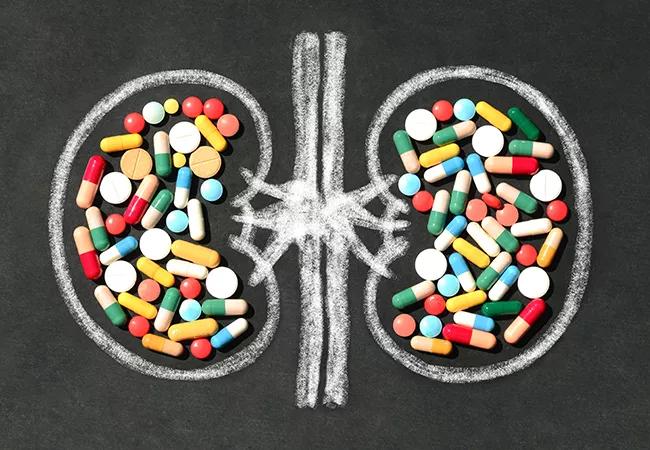The data behind new therapeutic agents and what’s next for improving patient care

Advertisement
Cleveland Clinic is a non-profit academic medical center. Advertising on our site helps support our mission. We do not endorse non-Cleveland Clinic products or services. Policy
Diabetes is a major cause of chronic kidney disease (CKD) and end-stage kidney disease (ESKD), and treatments that stop or delay the progression of diabetic kidney disease (DKD) will have a major impact on clinical outcomes. Over the last decade, there have been significant research efforts into identifying novel therapies to manage DKD. Until recently, there were few effective medications to delay the progression of DKD other than renin-angiotensin–aldosterone system (RAAS) blockade with ACE-Is or ARBs.
We are now in a new era of DKD management with randomized controlled trials showing the efficacy of newer classes of medications including sodium-glucose transport protein 2 (SGLT2) inhibitors, glucagon-like peptide-1 (GLP1) agonists, and newer mineralocorticoid receptor antagonists (MRAs), which have shown potential to surpass the benefits of ACEIs or ARBs alone. With the availability of these new treatment options, there can be a renewed focus on the preservation of kidney function.
This is the focus of a recent article my Cleveland Clinic colleagues and I recently authored that was published in the Journal of Clinical Medicine.
Multiple landmark studies as described in the review article have shown the value of adding these new therapeutic agents to ACE-I or ARB to preserve kidney function. This review provides a summary of the trials which clearly show benefits with the newer classes of medications. In addition to blood sugar control, blood pressure control, lipid management, and lifestyle modification, the use of ACE-Is or ARBs along with SGLT2 inhibitors, GLP1 receptor agonists or newer MRAs should become the cornerstone of treating diabetic kidney disease.
Advertisement
The “Kidney Disease: Improving Global Outcomes (KDIGO) diabetes management in CKD” guideline from 2020 emphasizes the use of these SGLT2i and GLP1 agonists. It’s very likely to be updated to include the use of newer MRAs as well, as these studies were published after the 2020 guideline.
Other therapeutic options are also being explored and may increase the repertoire of management options. Advances in molecular biology and genetics may provide future avenues for personalized medicine for patients with DKD.
We will need strategies to increase the appropriate use of these medications. This will require provider and patient education, and infrastructure and collaboration across specialties to identify patients who would benefit from these therapies. We must also prioritize the availability and affordability of these medications for these patients.
Cleveland Clinic’s Department of Kidney Medicine is also currently involved in an ongoing multicenter study of SGLT2 inhibitors in kidney disease (EMPA KIDNEY), which is looking at outcomes in patients with kidney disease and including patients with glomerular filtration rate levels lower than in prior studies, irrespective of the presence or absence of diabetes.
Advertisement
Advertisement

Pediatric urologists lead quality improvement initiative, author systemwide guideline

Fixed-dose single-pill combinations and future therapies

Reproductive urologists publish a contemporary review to guide practice

Two recent cases show favorable pain and cosmesis outcomes

Meta-analysis assesses outcomes in adolescent age vs. mid-adulthood

Proteinuria reduction remains the most important treatment target.

IgA nephropathy is a relatively common autoimmune glomerular disease that can be diagnosed only by biopsy

Oncologic and functional outcomes are promising, but selection is key